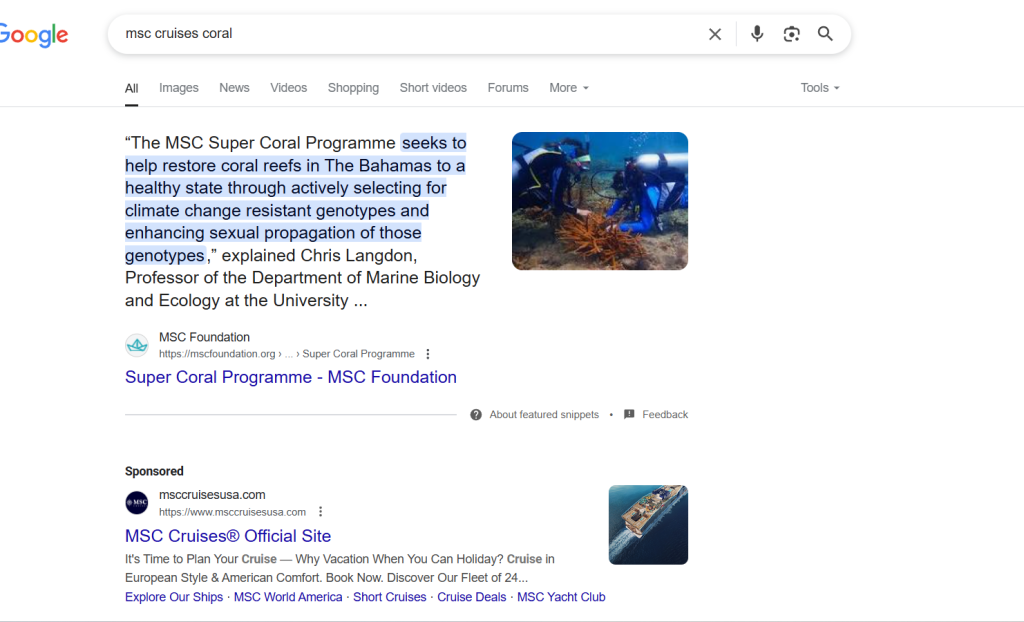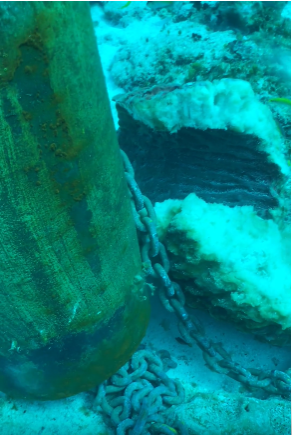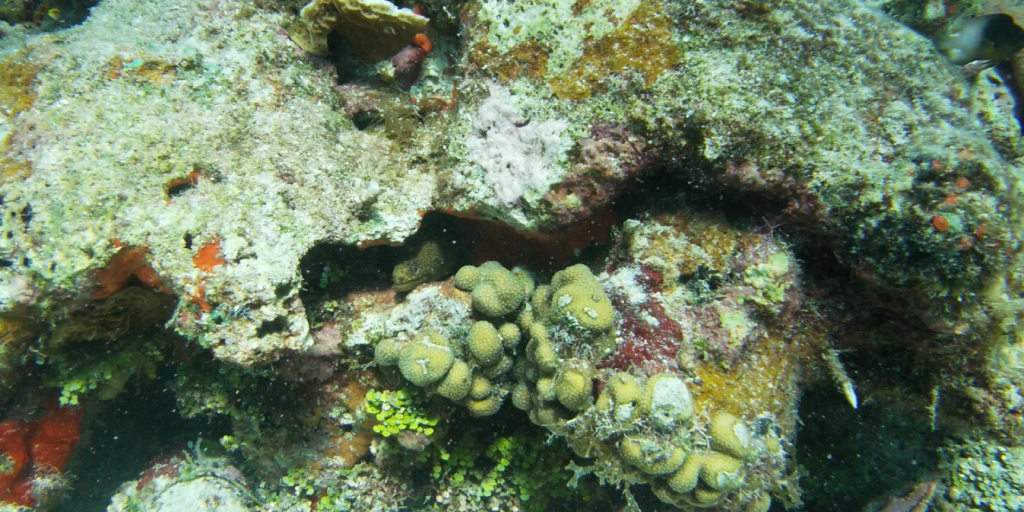The MSC Cruise Foundation: A Coverup for Coral Reef Destruction
MSC Cruises is destroying one of Cozumel’s most important coral reefs. Right now, MSC is pushing to build a new cruise ship pier directly on top of Villa Blanca Reef, Cozumel’s only coral reef located outside of protected areas as well as one of the most actively restored coral reefs on the island.
However, if you’ve searched “MSC Cruises coral” or “MSC Foundation” on Google or TikTok, you probably won’t see anything about this. That’s not an accident. Instead, all you’ll find are carefully crafted stories about MSC’s so-called environmental efforts, mostly from their MSC Foundation.

MSC Cruises' Threat to Villa Blanca Reef
Villa Blanca Reef, located off the western coast of Cozumel, is part of the Mesoamerican Barrier Reef System. This reef is not only a ecologically significant in itself, but is also the site of the Cozumel Coral Reef Restoration Program (CCRRP), which has successfully planted over 10,000 coral fragments since 2017.
Despite its ecological significance, MSC Cruises is backing the construction of a fourth cruise terminal directly over Villa Blanca Reef. This $25 million project includes an 800-yard pier and an exclusive beach club, Cabo Martarraya, which would privatize one of Cozumel’s last public shorelines.
Construction activities have already begun, with drilling platforms taking soil samples, already damaging 100-year-old sponges and coral and live rock. This development threatens to undo years of restoration work and disrupt the local marine ecosystem.

A Closer Look at MSC's Super Coral Programme
The MSC Foundation’s Super Coral Programme, launched in 2019, focuses on restoring coral reefs around Ocean Cay, MSC’s private island in the Bahamas. The initiative involves cultivating resilient coral species in nurseries and outplanting them to degraded reef areas around their own private island, Ocean Cay.
While these efforts may seem commendable, the truth is that that MSC’s environmental initiatives serve more as public relations tools than genuine conservation efforts. The juxtaposition of coral restoration in the Bahamas with reef destruction in Cozumel raises questions about the company’s true commitment to environmental stewardship.
Ocean Cay and the Privatization of Marine Spaces
Ocean Cay, once an industrial sand mining site, has been transformed into a private island exclusively accessible to MSC Cruises passengers. While the island boasts conservation projects and pristine beaches, its exclusivity raises questions about the privatization of marine environments.
Unlike sites like Villa Blanca Reef in Cozumel, which remain publicly accessible and support community-led conservation efforts, local Bahamian communities and the general public have limited access to these restored areas development. At this point, if MSC cruises has their way, coral reefs that are accessible to the public will be a thing of the past. In the future, only those with money and the ability to travel will be able to see reefs in private, corporate owned areas.
What Is Greenwashing? (And How the MSC Foundation Exemplifies It)
Greenwashing is when a company presents itself as environmentally responsible while engaging in practices that harm the environment. It’s a form of marketing deception designed to build public trust and boost profits without making meaningful ecological commitments. In the case of MSC Cruises, their MSC Foundation has become a textbook example.
MSC’s Public Image vs. Reality
The MSC Foundation showcases glossy visuals and polished campaigns highlighting coral restoration, marine research, and sustainability. On the surface, it looks like a company that genuinely cares about ocean health. But when we compare these claims to their actions, such as supporting the construction of a massive cruise terminal over Cozumel’s Villa Blanca Reef, the contradiction is obvious.
MSC’s Super Coral Programme in the Bahamas has planted only around 300 coral fragments on a private island that is inaccessible to the Bahamian public. Meanwhile, in Cozumel, the Villa Blanca Reef is public, thousands of years old, and actively maintained by local conservationists, MSC is pushing to build a pier directly on top of it that will not only kill the Villa Blanca Reef, but also the of thousands of coral fragments planted by the CCRRP and destroy dozens of coral restoration platforms.
Environmental Messaging, Financial Motivation
The MSC Foundation’s mission statements and eco-campaigns are designed to align with the growing demand for sustainable tourism. But without meaningful actions that match the messaging, such as withdrawing support from the Cozumel pier project or compensating local reef restoration efforts, it amounts to branding, not environmentalism.
Greenwashing allows MSC Cruises to appear like an environmental leader while continuing the same extractive tourism practices that put marine ecosystems at risk. Their “commitment to conservation” becomes a shield from criticism, and a marketing tool to attract eco-conscious travelers, all while avoiding accountability.
Why This Matters
Greenwashing undermines real conservation. It distracts from local efforts, manipulates public perception, and allows corporations to profit off the appearance of sustainability. By calling out MSC Foundation’s contradictions, we push for authentic responsibility, not just clean branding, but real action.
If MSC wants to be taken seriously as a protector of coral reefs, they must:
Publicly oppose the Cozumel pier project,
Donate to the Cozumel Coral Reef Restoration Program to repair the damage already done,
Ensure their conservation sites are accessible and beneficial to local communities — not just cruise passengers.
Until then, the MSC Foundation is not a conservation leader. It’s a greenwashing campaign wrapped in corporate branding.

Community Response and Calls for Action
Local organizations and residents have voiced strong opposition to the pier project. Legal actions temporarily halted construction, but a recent changed in government has allowed it to proceed.
The Cozumel Coral Reef Restoration Program continues its efforts to rehabilitate the reef, relying on volunteers and donations. However, the scale of the proposed development poses significant challenges to these grassroots conservation initiatives.
How You Can Help Stop MSC Cruises From Destroying Coral Reefs
- Spread Awareness: Share information about the situation on social media platforms, making sure to use the keywords “MSC Cruises,” “Villa Blanca Reef,” and “coral” to explain what is happening to the reefs. (Keywords help algorithms pick that information up and spread it.) When encountering content on social media from influencers and travelers about MSC Cruises, consider leaving respectful comments highlighting the concerns regarding Villa Blanca Reef.
Support Conservation Efforts: Consider donating to or volunteering with organizations like the Cozumel Coral Reef Restoration Program.
Boycot MSC Cruises and Tell Them How You Feel: Contact MSC Cruises to express concerns about the impact of their developments on coral reefs.
Call: 1-877-665-4655
Influencers can also write to: influencers@msccruisesusa.com
Leave comments on their social media pages (Instagram, TikTok, Facebook)
Ask them how destroying a coral reef helps Cozumel in the long term. (Hint: it doesn’t.)
